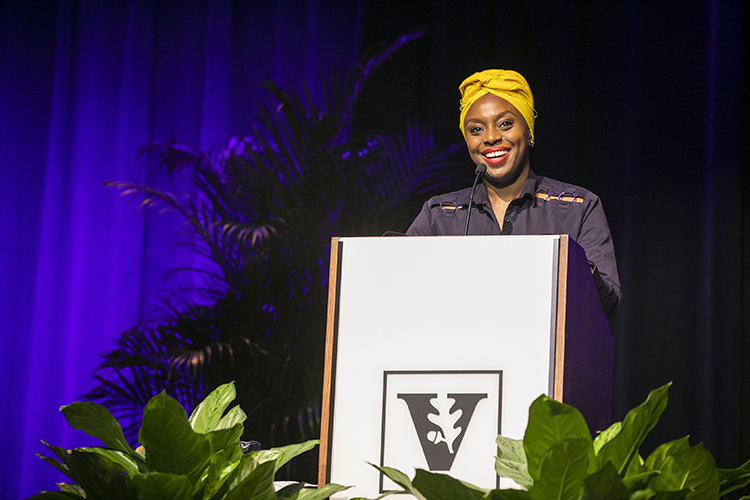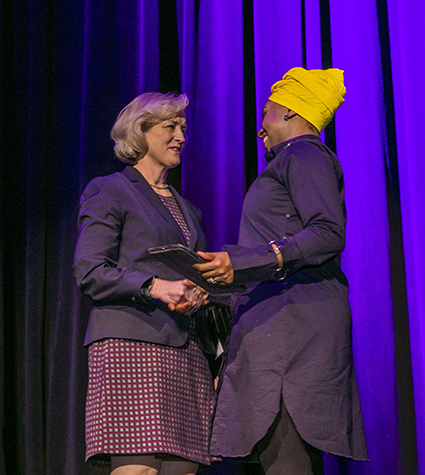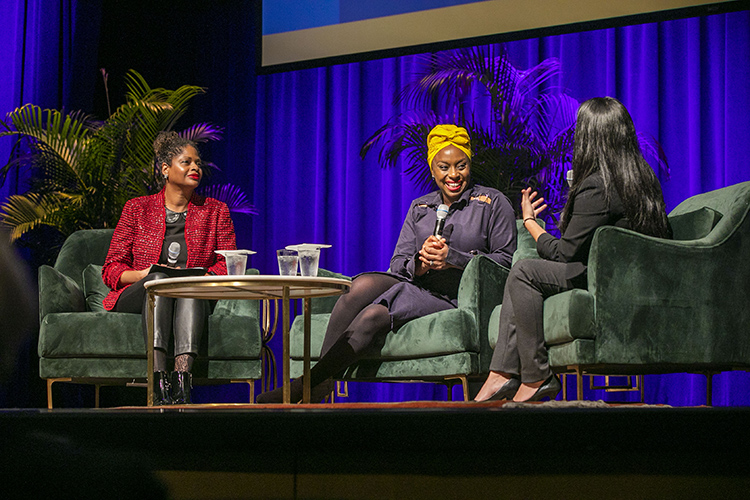
The power of storytelling—as a way to dismantle, re-envision and understand our culture and ourselves—resonated throughout the Nov. 21 Chancellor’s Lecture Series talk by Chimamanda Ngozi Adichie. The world-renowned Nigerian author spoke to a completely full audience at Langford Auditorium, receiving standing ovations at several points throughout her lecture, “Writer, Thinker, Feminist: Vignettes from Life.”
Interim Chancellor and Provost Susan R. Wente introduced Adichie, acknowledging the novelist’s prolific writing career, wildly popular TED talks and unique connection to this fall’s lecture series theme, “Culture of Respect; Culture of Caring.”

“Like all of us here at Vanderbilt, Ms. Adichie recognizes the importance of learning and scholarship, and how communication can shape an individual and open us up to new perspectives,” said Wente.
Adichie opened her talk by reflecting on her love of stories while growing up in Nigeria, where she saw books as manifestations of consolation and joy. As she became a writer herself, splitting her time between Nigeria and the United States, Adichie found that many Americans described her as a writer of “identity,” a term that she finds limiting.
“It’s not that I don’t write about identity, but there’s an assumption in Western discourse that identity is something that only members of subordinated groups write and talk about—women and people who are not white,” Adichie said. “The truth is that identity is about everyone.”
She also addressed her own burgeoning identity as a feminist icon, which is partially the result of her 2012 TEDx talk, “We Should All Be Feminists.” Regarding her personal history with the word, Adichie explained, “I was a feminist long before I knew what the word meant, long before I even knew there was such a word. I didn’t read feminist texts; I was a feminist simply because I watched the world and saw that the world did not give to women the same dignity it gives to men.”
Adichie further explored the complexities surrounding gender equality, double standards and sexism in modern society, offering solutions through storytelling and seeking to understand one another’s emotions and experiences better.
Following the presentation, Adichie engaged in a question-and-answer session with Tracey Sharpley-Whiting, the Gertrude Conaway Vanderbilt Distinguished Professor of Humanities and chair of the university’s Department of African American and Diaspora Studies, as well as graduate student Arelis Benítez, who studies religion, psychology and culture.
Sharpley-Whiting concluded the conversation with a question on behalf of two Ghanaian undergraduate students who were wondering about Adichie’s “Americanah” characteristics—a reference to her National Book Critics Circle Award-winning book and a term the author uses to describe a Nigerian who assumes and demonstrates qualities of American culture.

Adichie answered by explaining the influence and complexities of living in, and identifying with, two cultures. “We don’t have to be one thing,” she said. “There are many people in this country who are both African and American, and it’s perfectly fine. This idea that one has to choose is not realistic. There are parts of you that are shaped by your life here, but your sensibility is also shaped by the years spent wherever you’re from.”
The author ended the night by signing copies of her books, which include Americanah and her most recent work, Dear Ijeawele, or A Feminist Manifesto in Fifteen Suggestions.
The event marked Adichie’s first visit to Vanderbilt, Nashville and Tennessee. It was also the penultimate installment of the fall Chancellor’s Lecture Series, which strives to engage Vanderbilt and the wider community with leaders and visionaries who are shaping our world.
For more information about the series, visit the Chancellor’s Lecture Series website, email cls@vanderbilt.edu or follow @VU_Chancellor on Twitter and Instagram.